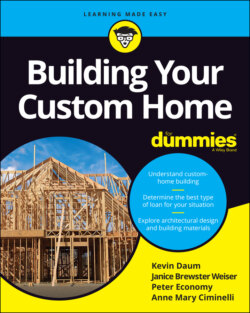Читать книгу Building Your Custom Home For Dummies - Peter Economy - Страница 42
Using expert interviewing techniques
ОглавлениеIf you haven’t hired project managers before, hiring a contractor will be a completely new experience for you. Generally, the contractor is trying to convince you to hire them for the job because that’s their business. At the same time, you’re trying to convince the contractor to take your project because the price is right and you like their work, or maybe because the market is really busy right now and contractors are hard to come by. With everyone so anxious to get going, the important issues, such as compatibility, can get passed over — leading to tense situations and unmet expectations later in the project. You must be sure you not only ask the right questions, but also use effective methods to get the information you need beyond the answers you want.
Here are some tried-and-true interviewing techniques that are guaranteed to help you find the best contractor for your job:
Let the contractor do the talking. If you’re doing more than 25 percent of the talking, you’re the one being interviewed. Let the contractor explain why they want this job. Have a standard list of questions or topics for each interview that allows the contractor to tell you what they’re like to work with and what services they provide. (We provide just such a list on the Cheat Sheet online — see the Introduction for information on how to access it.)
Let the contractor tell you what they want. If you ask “yes-or-no” questions about the contractor’s style and needs, they’ll surely try to answer based on what they think you’re looking for. Instead, ask them open-ended questions about their ideal project and the worst project they’ve ever had. Delve into details about their likes and dislikes. You’ll be working with them for at least six months on this project, and nothing is worse than an unhappy contractor.
Give the contractor problem scenarios. Anyone can run a project that goes perfectly smoothly all the time. You want to know how they deal with problem situations. Create stories of nightmare situations and ask the contractor how they would handle them. For example, what if the framer and the plumber get into an argument, and one walks off the job before the job is finished? If the contractor quakes in their boots with your questions, you’ll know they don’t have the strength to manage your project.
This project is your home, and your life savings are at stake. Compromise is okay to a point, but you need to have a good building experience to enjoy your home fully when you finally move in. Don’t assume that contractors are all the same. Pick the one who makes you feel comfortable and secure and then communicate, communicate, communicate.
